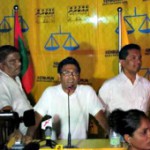The Attorney General’s (AG) Office has resumed issuing permits for lawyers after the publication of new regulations (Dhivehi) governing legal licences today.
The AG’s Office announced last December that it was ceasing the issuance of licenses pending amendments to regulations governing the legal profession.
Former Attorney Husnu Suood – also president of the Maldives Bar Association – has suggested that the regulations had been drafted without sufficient input from within the legal profession.
“We have brought to the attention of the Attorney General that the new regulation should involve the profession,” Suood told Minivan News after discussing the new regulations with fellow lawyers today.
In order to practice law in the Maldives, the new regulations state that an individuals must be a Maldivian citizen, married to a Maldivian, or reside in the Maldives, must be 18 years old, and must be of sound mind.
Prospective lawyers must not hold convictions for any hadd offences, for criminal breach of trust, or for rape. If an individual has been convicted of any other offences, seven years must have passed since the sentence was completed or pardoned.
Suood took issue with the regulation’s failure to define what the ‘other’ offences consisted of, particularly in light of the recent spate of contempt of courts cases.
“It’s very scary with the contempt issue – they can fine us or make an order for house arrest of 15-30 days. If we are unable to actually practice for seven years onward, that’s too much actually.”
A bill to regulate the legal profession is included in the government’s 207-bill legislative agenda, to be pursued during the current administration’s five year term.
In the absence of a law governing the legal profession when the new constitution was adopted in August 2008, parliament passed a General Regulations Act – recently renewed – as parent legislation for over 80 regulations without a statutory basis, including the regulation governing lawyers.
Appropriate regulator?
A 2013 report by UN Special Rapporteur for the Independence of Judges and Lawyers Gabriela Knaul argued that the AG’s role in the regulation of the legal profession was “contrary to the basic principles on the role of lawyers”.
Powers to issue licenses to practice laws as well as enforce disciplinary measures should not rest with the executive, Knaul advised.
Moreover, Knaul recommended that a “self-regulating independent bar association or council should be urgently established to oversee the process of admitting candidates to the legal profession, provide for a uniform code of ethics and conduct, and enforce disciplinary measures, including disbarment.”
Local lawyer Mohamed Shafaz Wajeeh told Minivan News today that, for the time being, the AG’s Office was the most appropriate body to be regulating the industry.
“We already have a legislation in the pipeline with considerable involvement from the Bar Association. I hope the bill is passed soon,” said Shafaz.
The Supreme Court’s attempts to regulate the legal profession in 2012 prompted an emergency meeting of the country’s top lawyers – prior to the formation of the Bar Association in April 2013.
The court’s regulations required all lawyers to be registered with individual courts before they could represent their clients there. Open criticism of the courts was also proscribed.
Suood today suggested that the AG’s regulations now created “two parallel systems” which “contradict with each other”.
“I think that the new regulations should have included the Supreme Court regulations because one issue we face day-in and day-out is that if there is an action administrative action taken by the court, for instance contempt of court issue and they take disciplinary action, we are unable to challenge those administrative actions.”
The Bar Association earlier this week called for the suspension of Supreme Court Judge Ali Hameed pending an investigation into allegations over the judge’s appearance in a series of sex tapes.
The group’s statement came just days after the suspension of its president, former Attorney General Husnu Suood, had been lifted by the court on the condition he refrain from engaging in any act that may undermine the courts.
Suood was told his January suspension was related to an allegedly contemptuous tweet regarding the Supreme Court’s decision to annul the first round of last year’s presidential election.
Charges of contempt were also used by the Supreme Court to dismiss senior members of the Elections Commission just two weeks before last month’s Majlis elections.




